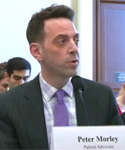A Hospital Initiative
Melissa Flores, MPH, LCSW, outcomes manager at the Hospital for Special Surgery, described her center’s hospitalwide intervention for promoting inclusive and safe care for LGTBQ+ patients. The initiative involved staff training on providing care to transgender and gender-non-conforming patients, federal and state laws, the hospital’s mission, a review of terms, and hospital’s script for data collection, and other tools and resources.
The hospital offers patients several opportunities to share their sexual orientation and gender identity (SOGI) data before their appointments, either with a patient portal or kiosks in waiting areas.
These data have been integrated into the electronic medical record, which can have important implications for care, Ms. Flores said. She mentioned a transgender patient whose demographic information was entered, but not their gender identity and sex at birth, leading to incorrect automatic lab calculations, which were based on legal sex. In another example, a nurse noticed the lack of an option to indicate the reason a patient didn’t have a period was due to hormone therapy. This option has since been added so relevant information can be included.
The goal is that the LGBTQ+ community “fully becomes integrated into the lifeblood of our hospital,” Ms. Flores said.
“Critical to this process has been our organization’s commitment to a culture shift that values diversity and inclusion for all,” she said.
Patient Perspective
Peter Morley, a prominent patient advocate with lupus and other health challenges who identifies as gay, said that when he was younger “discussing sexual identity and sexuality—that was not something I was comfortable with because I felt that I would be judged.”
When undergoing treatment for kidney cancer, his healthcare providers did not communicate with his same-sex partner.
“Having my caregiver not being involved is stressful,” Mr. Morley said. “Inclusion of my caregiver, whether it’s my same-sex partner, a friend, a family member, will definitely lead to better outcomes because they will be more prepared to help me manage my care.”
He has seen progress, but has testified several times on Capitol Hill to push for more change and inclusivity. The involvement of same-sex caregivers, in particular, is an area for improvement in healthcare, he said.
“There should be mandatory training for clinicians and their staff to teach them how to address caregivers because, to me, the more you incorporate the caregiver into the conversation—regardless of the nature of the relationship—the better patients will feel cared for, seen, and like many heterosexual partners, same-sex caregivers can provide invaluable support that can be a key factor in optimal patient care,” Mr. Morley said. “To truly make a difference in care outcomes and overall patient experiences, we need to begin these conversations.”



